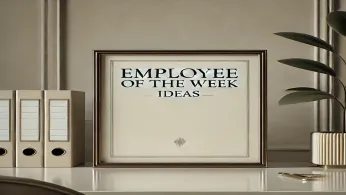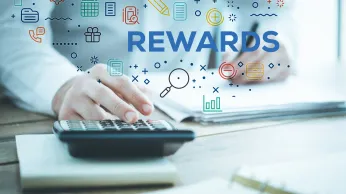Penghargaan Keterlibatan Karyawan: Jenis, Contoh & Praktik Terbaik yang Benar-Benar Berhasil
Pelajari dampak dari penghargaan keterlibatan karyawan dan bagaimana penghargaan tersebut meningkatkan semangat kerja, meningkatkan produktivitas, dan memperkuat budaya tempat kerja dengan contoh-contoh perusahaan yang nyata.
Di halaman ini
- Why employee engagement awards matter
- Examples of companies using employee engagement awards
- Types of employee engagement awards
- Best practices for implementing employee engagement awards
- How to measure the impact of employee engagement awards
- Boost engagement with AI-powered recognition and rewards using Empuls
- Kesimpulan
- Pertanyaan Umum
Keeping employees engaged is essential for any successful business. Companies that recognize and reward their teams for hard work create an environment where employees feel truly appreciated. In fact, organizations that focus on employee engagement often see a sharp rise in productivity, with research showing up to 21% higher profitability compared to those that don’t.
Employee engagement awards are one way to make this happen. These awards aren’t just a nice gesture—they are a way to show employees that their efforts matter. This recognition boosts morale, encourages loyalty, and builds a sense of belonging within the company.
Whether it’s acknowledging individual achievements, team collaboration, or milestones, engagement awards can transform the workplace into a place where people feel motivated and valued.
Why employee engagement awards matter
Employee engagement awards are more than just tokens of appreciation—they serve as a powerful tool to elevate performance and cultivate a positive atmosphere within the organization.
When employees are recognized for their hard work, they are more motivated to keep contributing at a high level. This recognition acts as a signal that the company values their input, which boosts both morale and productivity.
Employees who feel appreciated are more likely to stay with the company, reducing turnover rates—a key factor in cutting costs and retaining valuable talent. In fact, companies that consistently recognize their employees see 31% lower turnover compared to those that don’t.
Awards also go beyond just boosting individual motivation. They foster a sense of connection and belonging. When employees are rewarded for their contributions, they feel more engaged with the company’s goals and values, and this directly enhances teamwork and collaboration.
Knowing their work has a meaningful impact on the overall success of the business drives employees to stay dedicated and push for excellence. Whether it’s recognizing personal achievements or team efforts, employee engagement awards help build a strong, loyal workforce that’s committed to seeing the company succeed.
Examples of companies using employee engagement awards
Many companies have successfully implemented employee engagement awards to boost morale, motivation, and performance. Here are a few examples of how organizations use these awards:
1. HubSpot
HubSpot’s employee recognition program is built around its core values of transparency and empowerment. The “SPOT Awards” allow employees to nominate their peers for outstanding contributions, whether it’s for a specific project, embodying company values, or going the extra mile to support a colleague.
These awards are given regularly, fostering a culture of appreciation throughout the year. In addition to the SPOT Awards, HubSpot also celebrates employee milestones, such as work anniversaries, and offers performance-based awards to top achievers.
This layered approach to recognition not only boosts morale but also encourages a collaborative work environment where employees feel valued by both their peers and leadership.
2. DHL Express
DHL Express is well-known for its strong employee engagement practices, which are largely driven by its robust recognition programs. The “Employee of the Year” award is one of DHL’s flagship recognition initiatives, celebrating individuals who have made significant contributions to the company’s success.
On top of that, the “CEO Awards” are another prestigious recognition that highlights exceptional employees across the globe, providing them with an opportunity to meet senior leadership and be publicly acknowledged for their efforts.
These recognition initiatives have helped DHL Express build a culture of appreciation and have played a vital role in maintaining high levels of employee satisfaction, loyalty, and performance.
3. Southwest Airlines
Southwest Airlines has long been known for its employee-centric culture, and its employee engagement awards play a significant role in this. The company’s “Winning Spirit” awards are driven by peer nominations, where employees highlight colleagues who exemplify Southwest’s core values of teamwork, customer service, and positivity.
The awards are celebrated at company-wide events, where top-performing employees are publicly recognized. Southwest also focuses on creating a fun and engaging work environment with smaller recognition initiatives, such as spontaneous rewards for employees caught going above and beyond.
These programs have helped Southwest Airlines maintain its reputation as a company that prioritizes its employees, which in turn contributes to the airline’s high customer satisfaction and overall success.
Types of employee engagement awards
Employee engagement awards come in many forms, each tailored to recognize different contributions and enhance motivation. These awards are a way to show employees that their hard work doesn’t go unnoticed. Here are some of the most effective types:
1. Penghargaan berbasis kinerja
Recognizing exceptional individual performance is a key motivator. These awards celebrate employees who go above and beyond in their roles—whether it's exceeding sales targets, offering top-notch customer service, or consistently delivering excellent results.
Performance-based awards show that excellence is appreciated, helping to inspire continued high performance across the board. When employees know they are being measured and rewarded fairly, it strengthens their connection to the company and encourages them to strive for even greater achievements.
2. Team awards
Collaboration is at the heart of every successful business, and team awards recognize the collective efforts of a group that has achieved something extraordinary. These awards celebrate the success of teamwork, where every individual plays a part in reaching shared goals.
By honoring teams, companies foster a sense of unity and cooperation, reminding employees that working together can lead to outstanding results. Team awards not only motivate individuals to work harmoniously but also strengthen the bonds between coworkers, which leads to more cohesive and productive teams.
3. Milestone awards
Longevity and commitment deserve recognition, too. Milestone awards celebrate work anniversaries, project completions, or even personal achievements like obtaining certifications or completing training programs.
Recognizing employees for their long-term contributions reinforces loyalty and reminds them that their dedication is valued. Whether it’s a 5-year work anniversary or the completion of a major project, these awards mark important moments in an employee’s career, strengthening their connection to the company.
4. Peer-nominated awards
Often, employees are the ones who notice the hard work and dedication of their peers. Peer-nominated awards give employees the chance to highlight coworkers who have made a meaningful impact.
This type of recognition promotes a positive workplace culture, where employees feel appreciated not only by management but also by their colleagues. Peer nominations build a sense of camaraderie and trust, empowering employees to support and celebrate each other’s success.
Best practices for implementing employee engagement awards
Implementing employee engagement awards requires more than just handing out prizes. To make the awards meaningful and impactful, there are several best practices that companies should consider:
- Transparency and fairness: Employees need to trust the award system, and transparency is the foundation of that trust. The criteria for earning awards should be clear, and the selection process should be fair. When employees know what it takes to be recognized, they are more likely to engage with the process and feel confident in its fairness.
- Involvement of employees in the process: Involving employees in the nomination or voting process makes the awards more inclusive and meaningful. Allowing peers to nominate one another fosters a sense of unity and collaboration. It also gives employees a voice, helping them feel more engaged with the recognition system.
- Personalized and meaningful rewards: Generic awards may fall flat, but personalized rewards that cater to individual preferences or achievements leave a lasting impression. Whether it’s a gift that resonates with the recipient’s interests or a public acknowledgment of their specific contributions, personalized rewards show that the company truly values its employees.
- Regular and consistent recognition: Recognition shouldn’t be a one-time event. Creating a regular cadence of employee engagement awards—whether quarterly, bi-annually, or annually—keeps motivation high. Consistency is key to fostering a recognition-rich culture where employees feel valued throughout the year.
How to measure the impact of employee engagement awards
To ensure that employee engagement awards are making a positive impact, it’s important to measure their effectiveness. Here are some ways companies can track the success of these programs:
1. Employee satisfaction surveys
One of the simplest ways to gauge the impact of engagement awards is by directly asking employees. Conducting regular satisfaction surveys allows the company to gather feedback on how appreciated employees feel and whether the awards are boosting morale.
2. Improvement in performance metrics
Tracking performance metrics before and after the implementation of employee engagement awards can provide insight into their effectiveness. If employees are more motivated and productive, there should be noticeable improvements in key performance indicators (KPIs), such as project completion rates, customer satisfaction, or sales growth.
3. Reduction in turnover rates
High employee turnover is costly and disruptive, but companies that recognize and reward their employees often see lower turnover rates. By monitoring retention rates, companies can determine if engagement awards are contributing to a more loyal and committed workforce.
4. Increased participation in company initiatives
Engagement awards can also lead to greater participation in company events, programs, or initiatives. By tracking employee involvement in various activities, companies can measure how engaged their workforce has become after introducing the awards.
Boost engagement with AI-powered recognition and rewards using Empuls

Motivate your employees with AI-powered recognition and rewards through Empuls. Unlike traditional recognition programs, Empuls leverages AI to celebrate every achievement with timely, inclusive, and impactful recognition. This not only boosts employee morale but also leads to a measurable increase in engagement and retention.
Empuls offers an AI-powered platform that allows companies to create tailored recognition and reward programs that align with their unique goals. Here’s how Empuls supports effective employee engagement:
- Multiple award types: Empuls offers a variety of award types, including value badges, spot awards, and peer awards for in-the-moment recognition. It also supports approval-based awards, where nominations are reviewed by a jury panel, and performance or incentive-based awards to recognize employees for reaching specific milestones or goals.
- Automation: Empuls automates the entire recognition process, from distributing rewards to managing budgets, making it easier for companies to run their employee engagement programs efficiently.
- Customization: Every recognition program can be customized to match the company’s culture and values, ensuring that awards are meaningful and resonate with employees.
- Rewards & budgets: With Empuls, reward budgets can be automated, allowing managers to easily allocate funds and track utilization. Employees can instantly redeem their rewards through a built-in rewards store, creating a seamless recognition experience.
By incorporating Empuls into your employee engagement strategy, you can go beyond traditional recognition and create a culture where employees feel consistently valued and motivated.
Kesimpulan
Employee engagement awards are a valuable tool for any company looking to build a motivated and loyal workforce. They go beyond simple recognition, creating a culture where employees feel appreciated, empowered, and connected to the company’s success.
From performance-based recognition to peer-nominated awards, these programs help foster teamwork, boost morale, and reduce turnover. When implemented effectively, employee engagement awards can transform the workplace, driving both individual and organizational success.
By taking the time to recognize and reward employees, companies not only strengthen their internal culture but also position themselves as employers of choice.
Pertanyaan Umum
1. What are employee engagement awards?
Employee engagement awards are recognition programs designed to acknowledge and reward employees for their contributions, achievements, and dedication to the company.
2. Why are employee engagement awards important?
These awards boost employee morale, foster a positive work culture, improve productivity, and help reduce turnover by making employees feel valued and appreciated.
3. What types of employee engagement awards can companies offer?
Common types include performance-based awards, team awards, milestone awards, and peer-nominated awards, all tailored to recognize different achievements.
4. How do you implement an employee engagement awards program?
To implement an effective program, ensure transparency in the selection process, involve employees in nominations, personalize rewards, and offer consistent recognition.
5. How can employee engagement awards improve company performance?
Recognized employees tend to feel more connected and motivated, which leads to higher productivity, better teamwork, and a stronger commitment to company goals.
6. How do you measure the success of an employee engagement awards program?
Success can be measured through employee satisfaction surveys, improvements in performance metrics, reduced turnover rates, and increased participation in company initiatives.
7. Can peer-nominated awards help improve team dynamics?
Yes, peer-nominated awards encourage employees to recognize each other’s efforts, fostering a culture of teamwork and mutual respect, which can improve overall team dynamics.
8. What are some examples of companies using employee engagement awards?
Companies like HubSpot, DHL Express, and Southwest Airlines have successfully implemented engagement awards to motivate employees and create a positive workplace culture.













